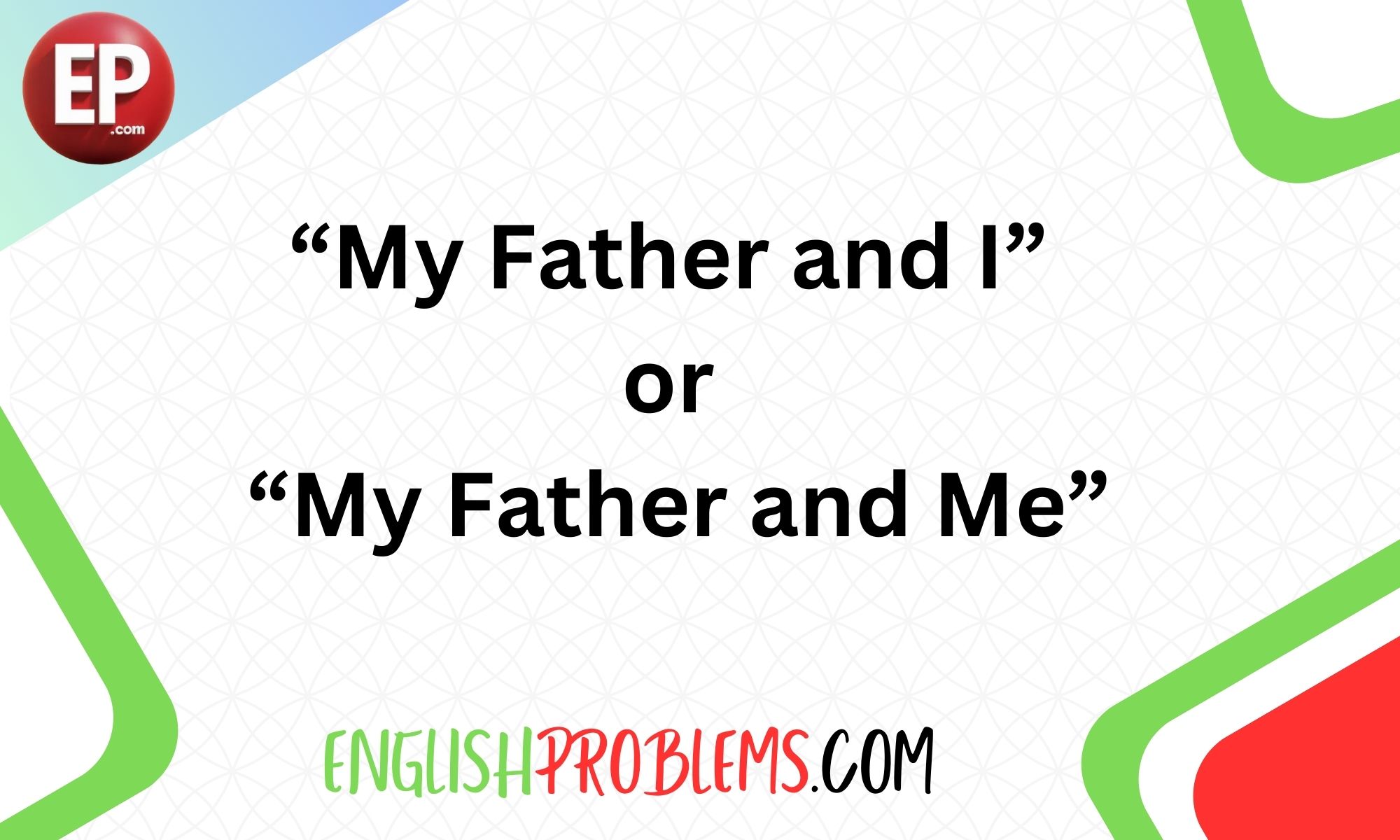When you’re speaking or writing, it’s crucial to use the right pronouns to convey your message clearly. One common area of confusion involves choosing between “My father and I” and “My father and me.”
This blog post aims to clear up that confusion and help you master the use of subjective and objective pronouns.
Understanding Subjective and Objective Pronouns
To begin with, let’s define pronouns and their roles in sentences. Pronouns are words that replace nouns in sentences to avoid repetition and streamline communication. For instance, instead of saying “John and Mary went to John’s house and then Mary went to the store,” you would say “John and Mary went to their house and then they went to the store.”
Subjective Pronouns
Subjective pronouns are used when the pronoun is the subject of the sentence. These pronouns include:
- I
- You
- He
- She
- We
- They
In the sentence “I went to the store,” “I” is the subject performing the action of going to the store.
Objective Pronouns
Objective pronouns, on the other hand, are used when the pronoun is the object of the verb or preposition. These pronouns include:
- Me
- You
- Him
- Her
- Us
- Them
In the sentence “She gave the book to me,” “me” is the object receiving the book.
Examples of subjective and objective pronouns in action:
- Subjective: She and I went to the park.
- Objective: The teacher gave a gift to her and me.
“My Father and I” – Subjective Case
When you use “My father and I,” you are treating both yourself and your father as the subject of the sentence.
Usage in Sentences
To determine if “My father and I” is correct, check if both are performing the action of the verb. Here are some examples:
- Correct: My father and I went to the market. (Both you and your father are doing the action of going to the market.)
- Incorrect: My father and I went to the market. (Incorrect if “went” is not an action performed by both.)
Grammar Rule
In compound subjects, both nouns and pronouns should be in the subjective case. If you’re discussing what you and another person did together, use the subjective pronoun.
Examples:
- Correct: My father and I are planning a trip.
- Incorrect: My father and me are planning a trip.
Here’s a quick transformation example:
- Incorrect: The teacher gave the award to my father and me.
- Correct: My father and I accepted the award.
“My Father and Me” – Objective Case
When using “My father and me,” you are treating both yourself and your father as the objects of the action.
Usage in Sentences
To determine if “My father and me” is correct, check if both are receiving the action. Here are some examples:
- Correct: She invited my father and me to the party. (Both you and your father are receiving the invitation.)
- Incorrect: She invited my father and I to the party. (Incorrect if “invited” is not an action done by both.)
Grammar Rule
In compound objects, both nouns and pronouns should be in the objective case. If you are receiving the action along with another person, use the objective pronoun.
Examples:
- Correct: The gift was for my father and me.
- Incorrect: The gift was for my father and I.
Here’s a quick transformation example:
- Incorrect: My father and I went to the store with her.
- Correct: She went to the store with my father and me.
Tricks to Determine Correct Usage
Understanding when to use “I” or “me” can be tricky, but here are some helpful methods to get it right.
Isolation Method
One effective method is to isolate the pronouns. Remove the other noun and check if “I” or “me” fits better.
- Example:
- Incorrect: My father and I went to the concert.
- Isolated: I went to the concert. (Correct)
- Incorrect: My father and me went to the concert.
- Isolated: Me went to the concert. (Incorrect)
Testing with Sentences
Practice by creating sentences where you can test different scenarios. This helps reinforce the correct usage.
Examples:
- Testing with Subjective Pronouns:
- Sentence: My father and I will meet at the restaurant.
- Test: I will meet at the restaurant. (Correct)
- Testing with Objective Pronouns:
- Sentence: She gave the book to my father and me.
- Test: She gave the book to me. (Correct)
Mnemonic Devices
To remember the correct pronouns, you can use mnemonic devices. For instance, think of “I” as the one performing the action and “me” as the one receiving it.
Mnemonic Example:
- I is for Initiator (Subject)
- Me is for Receiver (Object)
Common Misconceptions and Errors
Many people struggle with using “I” and “me” correctly due to common misconceptions or informal speech.
Informal Speech
In casual conversations, people often mix up “I” and “me” without realizing it. For example:
- Incorrect: John and me went to the park.
- Correct: John and I went to the park.
Peer Pressure in Language
Sometimes, repeated exposure to incorrect usage can influence you. Hearing incorrect forms often can make you unsure about the right choice.
Example: If everyone around you says “John and me went,” you might start doubting “John and I” even though it’s correct.
Examples of Misuse
Here are some common phrases with incorrect usage and their corrections:
- Incorrect: Me and my friend are going to the movies.
- Correct: My friend and I are going to the movies.
Practical Application in Writing and Speaking
Using the correct pronouns is not just about following grammar rules; it’s also about clear and effective communication.
Importance in Professional Writing
In professional and academic writing, using correct pronouns enhances credibility. It shows attention to detail and helps convey your message precisely.
Impact on Clarity and Perception
Correct grammar improves clarity and impacts how others perceive your intelligence and professionalism. Using “I” and “me” correctly avoids confusion and demonstrates strong language skills.
Tips for Everyday Use
- Read Aloud: Reading sentences out loud helps identify mistakes.
- Practice Regularly: Regular practice helps reinforce the correct usage.
- Ask for Feedback: Don’t hesitate to ask for feedback on your use of pronouns.
Conclusion
Mastering the use of “My father and I” versus “My father and me” can greatly improve your communication. By understanding the differences between subjective and objective pronouns and practicing their usage, you can enhance both your writing and speaking skills.
Summary of Key Points:
- Use “My father and I” as the subject of a sentence.
- Use “My father and me” as the object of a sentence.
- Apply tricks like the isolation method and practice with exercises.
- Be aware of common misconceptions and errors.
- Ensure correct pronoun usage in professional and everyday communication.
With these insights, you’ll be well-equipped to use “I” and “me” correctly in any context, making your communication clear and effective.

Lucy Wright combines her academic background with a flair for simplifying the intricate details of grammar. Her practical advice and clear explanations empower readers to improve their writing skills and grasp challenging concepts effortlessly.










